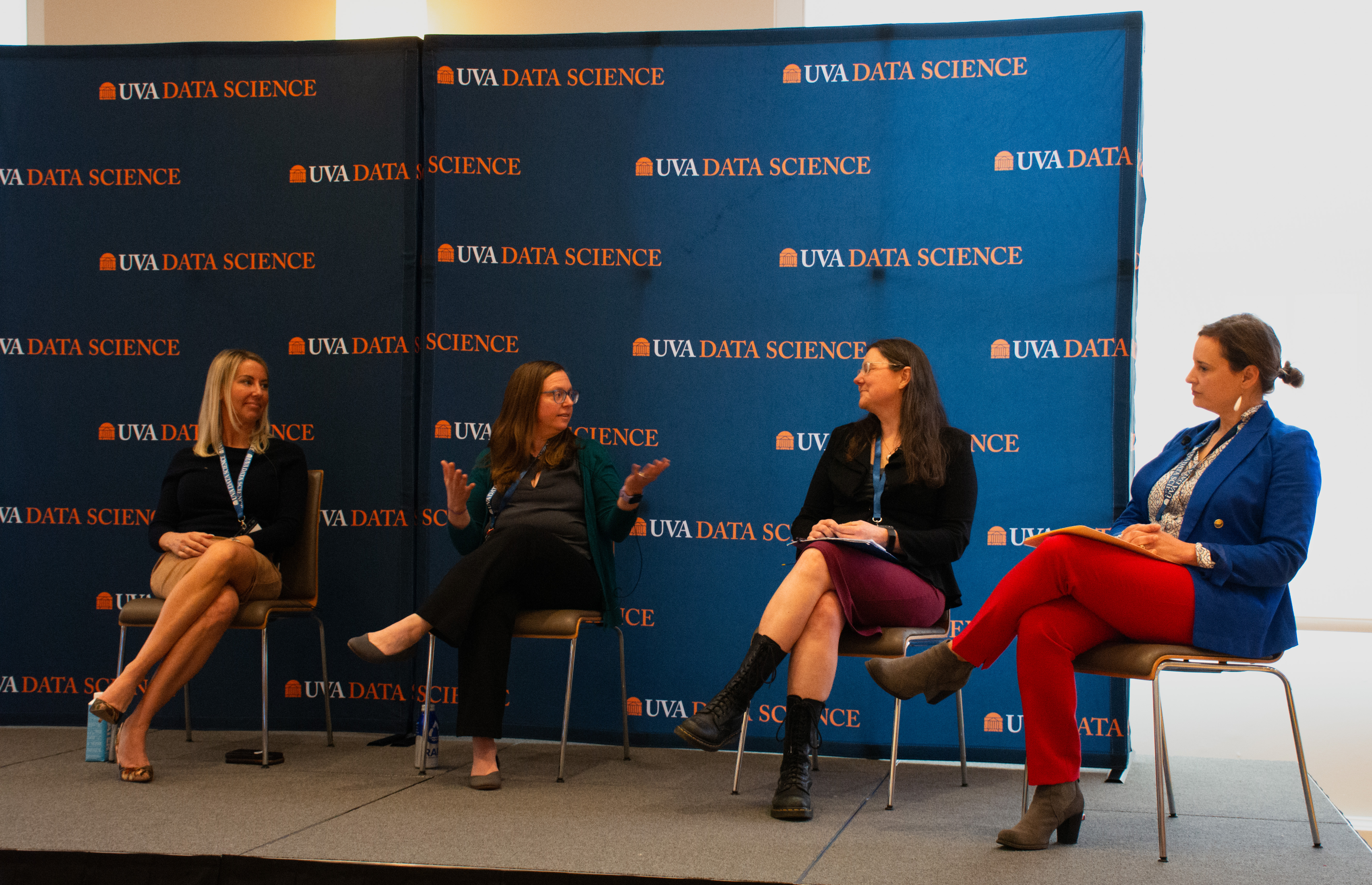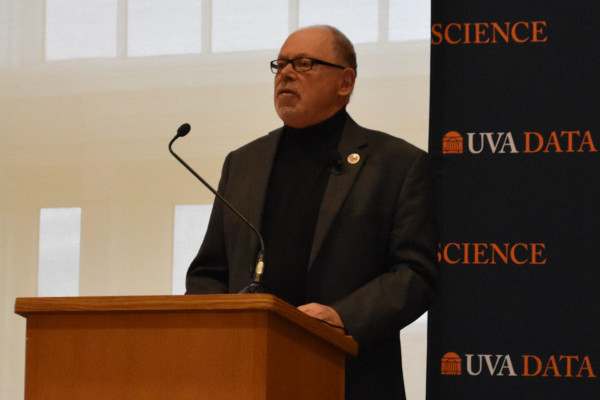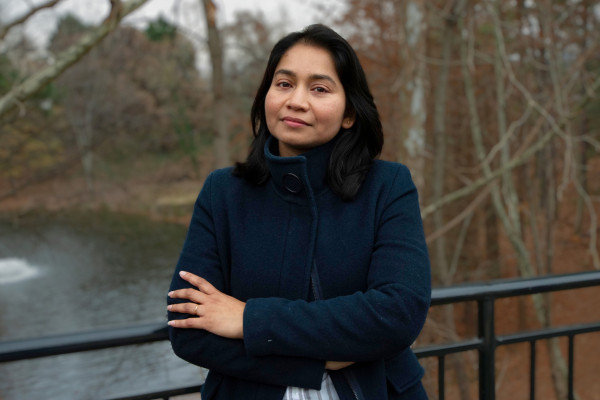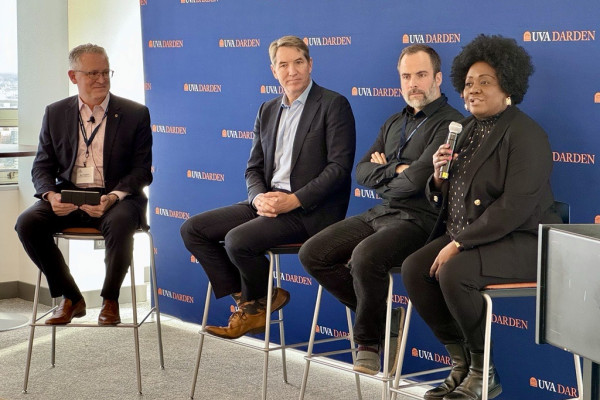
A Day to Inspire: Key Takeaways from WiDS 2024

From the different paths to data science to how the field can be an instrument for the public good, speakers throughout the day at the Women in Data Science Charlottesville conference made the case that data science is an inclusive field, full of opportunity.
WiDS Charlottesville is independently organized by the University of Virginia's School of Data Science to be part of the mission to increase participation of women in data science and to feature outstanding women doing outstanding work. This year's event focused on inspiring the next generation of women in data science.
The conference, held at UVA's Newcomb Hall with attendees also participating virtually, featured panel discussions from industry experts, sessions on coding and other technical skills, and keynote remarks from Laura K. Ipsen, president and CEO of Ellucian.
Here are key takeaways from the day's events:
There are many pathways to data science
WiDS kicked off with opening remarks from Karolina Naranjo-Velasco, a doctoral student at the School of Data Science. She shared how she came to the United States from Colombia, where she was a human rights lawyer interested in how armed conflicts exacerbate inequality. Despite her limited English skills when she came to UVA, she discussed how she found a home in data science, a community of people from all walks of life.
"We all have our own stories of how we came to data science, and we believe there are many more still to be written," she said.
Naranjo-Velasco has now been participating in WiDS for four years and explained how the conference had made a profound impact on her, particularly its celebration of diversity.
"When we all, regardless of gender, of any personal characteristic, come together in solidarity, we create a powerful force for change," she said.
"Even though I don't come from a typical data science background, my voice matters," she later added. "Your voice matters."
From there, Farhana Faruqe, an assistant professor of data science at UVA, shared her data science story, one that began when she worked as a software developer in Bangladesh. She emphasized the importance of ethical artificial intelligence, which will be a focus of her Jefferson Trust-funded project aimed at preparing UVA students for careers in trustworthy AI.
"Everyone is going to be impacted if we do not have responsible AI," she said.
She also discussed her nonprofit, AI-for-Equity, which is working to empower women and girls in Bangladesh by training them in coding and technology. It's a mission she felt driven to pursue after seeing pathways not opened for many women and girls in her home country, who were discouraged from pursuing technology-focused careers.
"That kind of mentality is really dangerous," Faruqe said.

Faruqe then moderated a panel of women data scientists, all with different backgrounds, who shared their stories of how they are forging successful careers in the field.
Melissa Phillips is a 2020 graduate of the residential data science master's program at UVA and now works as a software engineering manager with the geospatial data science company GA-CCRi. She spent many years as a math teacher before pursuing a graduate degree in data science and urged anyone considering a similar career shift not to be deterred from exploring opportunities in the field out of a sense that "it's too late to make a change."
"The more you practice, the better you get," she said.
Whitney Cathcart, who spent 30 years in the fashion industry, echoed that sentiment in laying out how she transitioned to data-focused work.
"I did what most people don't do in their late 40s, which is quit a big cushy job and go out on your own," she said. She is now co-founder and chief commercial officer of 3DLOOK, a company that uses AI-powered body scanning to enhance fitting.
The theme that emerged from all of these opening speakers was clear: There is no single path to a successful data science career, and those who are committed to making an impact can find a home in the field.
'Getting stuck' can be illuminating
Attendees did more than just listen at this year's WiDS conference. Two late-morning sessions focused on providing data science training.
In one, Ali Rivera, a 2023 graduate of UVA's data science master's program, gave a detailed presentation on coding. Not long after graduating, Rivera became the first alum of the School of Data Science to be hired on staff. The former high school chemistry teacher now works with undergraduates in the program.
At the beginning of the session, Rivera made clear this would be an interactive coding activity: "We are gonna get our hands dirty," she said.
She then provided a crash course on coding fundamentals, covering topics like Google Colab and variables, as she walked participants through how to run Python. Rivera led the group through an exercise where they examined data to determine whether cells were cancerous or not.

As she went through her materials and the many functions that were being used, she reassured attendees who might be wondering how anyone could remember all of these details.
"The answer is, you don't remember —
After finishing the exercise and fielding questions along the way, Rivera offered words of wisdom for aspiring data scientists who might soon find themselves immersed in a world of coding.
"Just remember, if you are learning to code, making mistakes and getting stuck is part of the process. Don't let that deter you. Oftentimes, the best understanding comes from things that you were stuck on the longest," she said.
Finding your 'why' is vital
The opening afternoon panel focused on a key tenet of UVA's School of Data Science: using the discipline for the public good.
The session kicked off with moderator Rebecca Schmidt, director of belonging operations and strategy at the School of Data Science, asking panelists how they talked about data science with their stakeholders.
"How do you make it real and valid for them?" she asked.
Jessica Stroop, chief of data strategy with the U.S. Justice Department's Criminal Division, said she underscores the stakes of the moment but also the tools that can be used to meet them.
"The ability to connect data to public policy right now is probably more critical than ever, but the upshot is that we have the technology and the data to do it," she said.
Celeste Lemrow, associate chief of program analysis and evaluation with the Cybersecurity and Infrastructure Security Agency, said that she emphasizes a process-oriented approach when working with her colleagues in the public sector.
"I'm here to help people answer questions, and we always start with a question," she said. "And once we know what the question is, then we're going to figure out what the best way to answer it is — and sometimes that is data science and then sometimes it's something else."
Another issue that arose was the notion of data science as an iterative process. Schmidt spent 12 years working in public health for public health agencies, including during the early days of the pandemic, before coming to UVA. She noted that embracing opportunities to revisit what might be missing from an initial data analysis, and what biases might be present, was important for data scientists and policymakers in the public sector.
"You don't always have the time to do the analysis you wish you could," she said.
Panelists also addressed why they thought a data scientist should want to work in the public sector as well as how to handle situations when their work may not lead to the kind of positive change they seek.
"You can do the kind of technical work that you love, whatever it is, and you always know who you're helping," Lemrow said in explaining what she enjoyed about working for the government.
"It may not be for everyone, but for me, knowing what the why is at the end of every day is hugely valuable and rewarding," she added.
Michele Claibourn, an assistant professor of public policy at the University's Batten School of Leadership and Public Policy, said that data science for the public good is "about the long game."
"It's just doing it again and again and again until you have a window of opportunity that hits right," said Claibourn, who is also the director of equitable analysis at The Equity Center at UVA.
"Sometimes it just takes patience," she said.

'Follow what you love'
Before the keynote remarks capping the event, the conference heard from three School of Data Science graduate students who presented their research in technical lightning talks.
Sunidhi Goyal, a master's student, discussed her work on understanding the challenges and opportunities of diverse data governance regulatory frameworks around the world. Jiaxing Qiu, a Ph.D. student, laid out her research on how social media can promote a culture that encourages eating disorders. And Jade Preston presented her analysis of hyperspectral image unmixing.
The innovative and important work from these students at an early stage in their careers epitomized the theme of the day: inspiring the next generation of women data scientists.
Finally, the conference heard from Laura K. Ipsen, president and CEO of Ellucian, which provides technology solutions to higher education institutions around the world.
She began by recounting her personal story, including when she was asked what she wanted to be when she grew up by her eighth-grade history teacher.
"I proudly said, 'I want to be an ambassador.' You know what he said? 'Well, Laura, that's so interesting, but only men are ambassadors.'"
"I am so happy times have changed," Ipsen said. "But you know what? He inspired me."
She realized the principle that would drive her career trajectory: "Follow what you really love to do, and you'll find your way."
Ipsen laid out her professional journey. She graduated from UVA, landed at Pricewaterhouse Coopers, and consulted on Capitol Hill. Soon, she came to another realization: "I fell in love with technology."
This new passion would take her to companies like Cisco, Microsoft, and Oracle. Eventually, she took over as president and CEO of Ellucian, which serves higher institutions in more than 50 countries, representing millions of students.
Ipsen talked about navigating different technological waves throughout her career, but that this moment, defined by AI, feels different.
"I think it's going to be the game changer, way beyond personal computing and all of us having an iPhone," she said.
Ipsen described specific ways she hopes AI and data will prove useful in serving student populations. For example, she suggested how insights gleaned from data could lead to more early and effective interventions for students experiencing anxiety.
"I do believe that we're in this era of unleashing data in ways that we can make sure that students aren't in danger and support the goals of an institution," she said.
Ipsen capped off her remarks with a message to students and aspiring women data scientists that captured the spirit of the conference.
"Follow the path that really no one else is following," she said. "Find your path."




